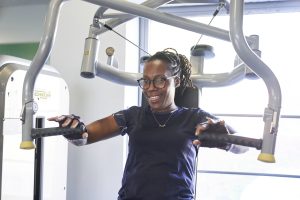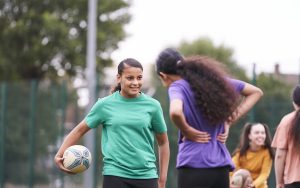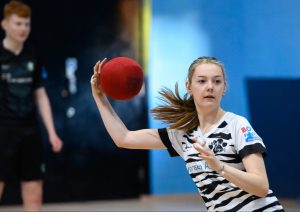As the world celebrates International Women’s Day, Women in Sport speaks with voices from across the sporting landscape about the progress made and the challenge ahead to level the field for those working in the sector.
Last year our research told us that 40% of women working in sport feel undervalued. Is this still the case?

Liz Nicholl, Chief Executive of UK Sport shares her insight from the performance sport end of the spectrum, she says;
“I know for a fact that it has because over the last couple of years I have worked with women in the high-performance system and asked them how they’re feeling and what it is that is actually stopping them stepping up into more senior roles. We have an annual conference where about 300 people from across the system get together and we’ve had open sessions where we get to hear from women. These women said they thought there were several things holding women back in the high-performance system. They wanted to see more role models of women that had been successful and managed to get to the top in various roles. Secondly, they wanted more networking opportunities and some support to be able to discuss common issues. Thirdly, they thought that there were potential barriers at the recruitment point, with recruitment processes often led by men and there is potential for unconscious bias. They also said there needed to be better understanding and more opportunities for flexible working. In terms of culture, they said they wanted a more developmental culture”.
However, for others across wider sport industries, some positive change has been made:
Lisa Parfitt, Managing Director of Engine Sport (formerly Synergy) believes the commercial side of the sector has vastly progressed in recent years;
“The culture of sport has hugely changed in the commercial sector as a response to what’s happening on the pitch and in society in regards to how women are perceived and the opportunities available to women. In my experience I’ve seen enormous strides forward and women are absolutely recognised for their expertise and talent within the commercial sector and because they bring a different perspective. I think there has been a positive impact as a result because of a generational and cultural shift towards a more equal society.”

Ann-Marie Batson, sports broadcaster who works for the BBC, BBC5Live and Talksport and thinks the media is also starting to realise significant change;
“I think there are greater prospects now for someone like me, a woman, a black woman, to progress in sports media. If you asked me that question 10 years ago, I think the straight answer would be no, but I think in the last few years a lot of eyes have been opened about the opportunities in front of us for more voices, more diverse voices, more inclusive voices, to be part of sport.
“I think in this age where openness and transparency, with 24-hour news and social media, people are under scrutiny and questions are being asked of them. When you think about this year alone, we have the Fifa Women’s World Cup and you have the Netball World Cup, female cricket has also exploded. This is a great time to build on this momentum and go with the ride.”
Globally, we still have a problem that there aren’t enough female coaches in high-performance sport.
Dame Katherine Grainger, Chair of UK Sport
How can the sector embrace change?
Women in Sport’s Beyond 30% research found that the top 4 ways to promote inclusivity and support progression for women in sport were the visibility of female role models, accessible mentors and coaches, flexible working and inclusive recruitment practices.

Dame Katherine Grainger, Chair of UK Sport; “Globally, we still have a problem that there aren’t enough female coaches in high-performance sport. There’s a big movement [at UK Sport] to create opportunities for athletes to become coaches once they leave their sport. We’ve also got a leadership programme and there’s a big push to make sure we’ve got a complete mix of men and women.”
And for Liz Nicholl, UK Sport are testing some of these solutions through culture health-checks; “We’ve done a lot of work over the last 12-to-18-months on culture in high-performance programmes to help address some of these concerns, for example, we have culture health checks in the form of surveys of athletes and support staff to help create a positive winning culture. We don’t want to lose that winning culture but we want to create a positive winning culture. This approach shines a light on what is working well and provides an early warning system to highlight problems and issues so that sports can see what needs to be done and can take action. That has been incredibly helpful in pointing out to the high-performance system, and each individual sport, areas where they can better and areas where athletes and staff are saying they want to see some change. I hope we can create an environment that will see more talented women come through.”
And for others, a deeper understanding of organisational culture is the starting point for making significant change including understanding often subtle and deep-rooted repeat behaviours and unconscious bias:

John Steele, Executive Director of Sport at Loughborough University, Chair of the English Institute of Sport and former CEO at both UK Sport and the Youth Sport Trust, is no stranger to the progress the sector has seen over the past decade but highlights the need for cultural change for greater equality in the sector;
“Over the past 10-15 years we have seen real progress in the influence of women in some key leadership roles in high-performance sport and sport more broadly. This is starting to change the culture within sport but now needs to spread to more NED (non-executive director) roles on boards, coaching and performance director roles, where diversity and inclusion is less evident.
“Culture is difficult to change. Often management solutions are created to address cultural challenges, which may go some of the way to creating initial momentum for change, but is never the complete solution. When it comes to culture, changing the way people think and behave has to be the focus and when it comes to gender equality, challenging unconscious bias is hugely significant.”
What’s next for Women in Sport?
Now is a critical time to use the momentum that is building to make long term change. Women in Sport are being funded by Comic Relief’s Gender Justice fund to continue to research workplace culture, diversity and inclusion in the sports’ workplace. The emphasis for the next two years is on identifying good practice from both within and outside the sector, testing their impact and providing practical support to enable women to thrive, influence and lead.
Ruth Holdaway, CEO of Women in Sport says;
“Over the next 2 years, Women in Sport’s focus will be the culture of the sport workplace. Identifying good practice, testing its impact and providing practical support. We recognise that with greater diversity comes greater difference and perspectives, which can slow down or influence decision making in ways that are challenging for organisations to adapt to. Thanks to funding from Comic Relief, Women in Sport’s goal is to prepare all leaders to engage women and embrace diversity.”





